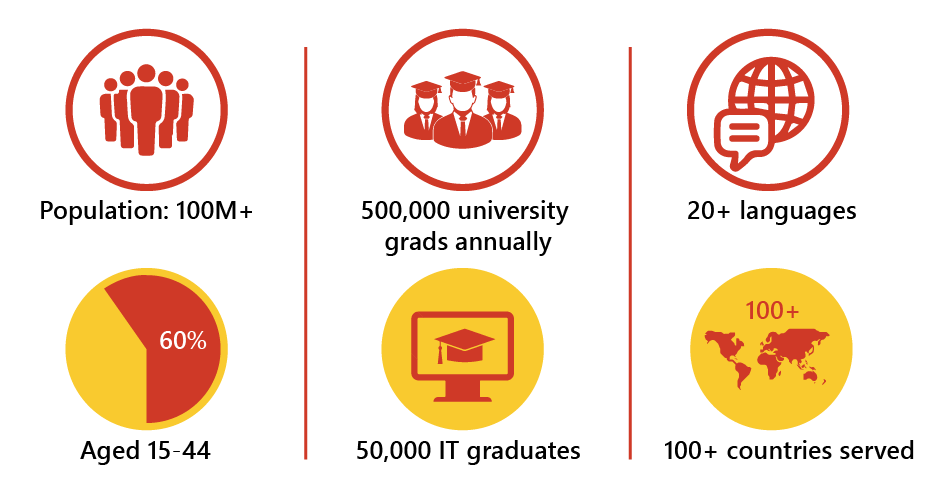
Top 3 Reasons Why Egypt is the Biggest Tech Hub in the Region
| Author: | Amr Fahmy |
|---|---|
| Last updated: | April 19, 2022 |
| Categories: | Uncategorized , Articles |
| Reading time: | 4 mins |
Top 3 Reasons Why Egypt is the Biggest Tech Hub in the Region
Since 1985, Egypt has invested heavily in the IT information technology field. This has helped the country establish a robust Information and Communications Technology (ICT) infrastructure, making Egypt the best offshore software development country a leading technology center in the region and a recognized hub worldwide.
There are many reasons why Egypt is one of the biggest tech hubs worldwide. In this blog, we’ll discuss the top three (3) reasons why it is an ideal outsourcing destination and how Egypt’s IT and BPO offshore software development to Egypt has gradually gained share in global markets.
1. Egypt’s uniqueness as a tech hub
The choice of destination plays an essential role when choosing a service partner, especially when they work closely with your internal teams. In Egypt, the ICT sector is the largest and fastest-growing contributor to the Growth Domestic Product (GDP), rising to 4.4% in FY 2019/2020. The sector’s exports increased to $4.1 billion in 2020 (13% increase from 2019).
Egypt’s unique location allows its workforce to adapt to different time zones and cultures quickly. Also, around 61% of Egypt’s population is under 30, allowing for better access to highly skilled young human resources.
According to Kearney’s Global Services Location Index for 2021, Egypt ranks 15th in global management consultancy. Egypt was also the only MENA country to make it to the top 20 in the index.
With all these unique qualities, Egypt is easily within the same rank as the Czech Republic, Hungary, Poland, and Romania as service providers. However, like the Philippines and India, the ease of building service centers on any scale sets Egypt apart from other nearshore staff augmentation destinations in Europe and other global destinations.
2. Highly educated and trained tech resources
In addition to the vast investment in ICT, Egypt is also rich in educated and highly qualified engineers and software developers who are well-versed in European languages. The country is also home to some of the top IT and Communication universities, including Cairo University, the largest university in the Middle East.
Every year, the country has about 500,000 graduates from over 100 institutes and 50 universities, with about 220,000 students in service-related fields, 50,000 of which are in IT-related fields. Most of these graduates are ready to engage in advanced processes and provide knowledge services in over 20 languages. This puts Egypt shoulder-to-shoulder with Poland and the Philippines as a strong outsourcing destination.
As a part of its extensive ICT plan, the Egyptian Ministry of Communication and Information Technology (MCIT) launched an initiative called “Our Future is Digital.” The goal is to train 100,000 young Egyptians and develop their skills in high market demand areas such as website design, data analysis, and digital marketing.

In 2020, the Ministry also launched an initiative called “Our Digital Opportunity,” which involved SMEs. The Ministry’s digital transformation initiative aimed to provide all government institutes with fiber-optic cable connections at an average investment of around six billion Egyptian pounds. After completing this process, approximately 32,000 buildings were connected.
According to IDC, Offshore software development in Egypt also offers one of the most competitive operating costs per full-time employee. Software development savings can reach about 60% compared to labor costs in other locations such as Bulgaria, the Czech Republic, and Romania, and Romania.
3. Heavily invested in Information Technology
Egypt has developed its ICT 2030 Strategy that contributes to achieving the Egypt Vision 2030 objectives of building a Digital Egypt. Under this strategy, the Egyptian government is increasing investments, digital government service reforms, capacity building and training programs, and infrastructure enhancements. The plan is to promote new initiatives that expand the ICT sector’s role and scale Egypt’s economic growth by focusing on capacity building, electronics design, manufacturing, and technology. This project also includes the digital transformation of core government services in education, healthcare, and government services.
According to the US Department of Labor, the estimated cost of hiring the wrong person can be at least 30% of their annual salary. That means that hiring the wrong developer can incur four months’ salary in damages to your business, at a minimum. This affects margins significantly since nearly three in four employers run the risk of a bad hire. Therefore, hiring remotely can be a highly efficient method to manage costs and ensure business success.
Overall, outsourcing can enhance operational costs, free up internal resources and accelerate business growth. Recently, the increased demand for businesses to expand and either start or complete their digital transformation has driven many companies to look to Egypt for outsourcing – a viable solution many companies have already embraced successfully.
If you have any questions, inquiries, or would like to extend your in-house skills with our resources, please don’t hesitate to schedule a call now with one of our technical managers.